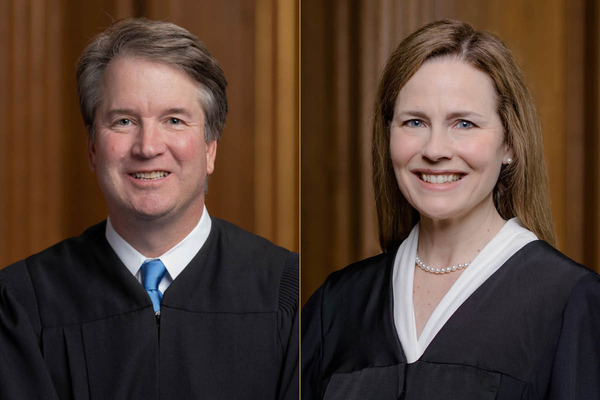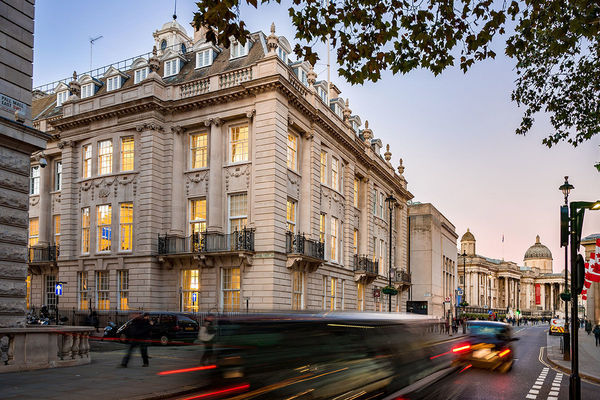ND London Law students learn constitutional law from two Supreme Court justices

Two justices of the U.S. Supreme Court taught seminars to students in the Notre Dame London Law Programme during the spring semester.
Justice Brett Kavanaugh and Justice Amy Coney Barrett each co-taught weeklong intensive seminar courses with Notre Dame Law Professor William Kelley at the University’s London Global Gateway.
“Notre Dame Law School is committed to providing the best educational experiences for our students,” said G. Marcus Cole, the Joseph A. Matson Dean and Professor of Law. “Justice Kavanaugh and Justice Barrett are gifted law teachers, and it is blessing to be able to offer their courses to our talented students in an engaging and respectful environment.”
Justice Kavanaugh co-taught Advanced Constitutional Law with Kelley for one week in March. The course examined how the Supreme Court has interpreted and understood the U.S. Constitution throughout history. Kavanaugh led the discussions and used several recent cases as class examples.
“It was a great experience for all of us to engage these subjects with someone whose job — with his colleagues, of course — is to do the work of the Court,” said Kelley.
Throughout his term on the Supreme Court, Kavanaugh has continued to teach, Kelley said.
“I think he really enjoys teaching,” said Kelley. “And I think he’s really enjoyed his relationship with students, mentoring and learning together.”
For one week in April, Justice Barrett co-taught American Constitutional Theory. Drawing from legal scholarship and Supreme Court cases, the class covered competing theories of the Court’s role in adjudicating constitutional cases. A recurrent theme of discussion was that people of good will can disagree about both the theory and practice of constitutional interpretation.
Barrett graduated from Notre Dame Law School in 1997 and joined the faculty as a professor of law in 2002. In 2017, she was appointed as a judge on the U.S. Court of Appeals for the Seventh Circuit. She remained a Notre Dame Law School faculty member and continued to teach part time after her judicial appointment. She was confirmed to the U.S. Supreme Court in October 2020.
“Justice Barrett, who has taught a generation of Notre Dame Law students, also led the discussion in this course,” Kelley said. “As in Justice Kavanaugh’s course, the students were active and engaged, and the discussion was open and lively.”

Nearly every student enrolled in the Notre Dame London Law Programme this spring — 32 students out of 39 total — took one of the courses taught by the justices.
“Both Justice Kavanaugh and Justice Barrett said they greatly enjoyed their time here,” Kelley said, “and both spoke glowingly about the level of engagement and openness to discussion of our students.”
Kelley said the seminars offer students an opportunity not only to learn from judges on the nation’s highest court but to get to know them as human beings.
“I think it’s great for Notre Dame, and it’s good for the legal profession for students to be around Supreme Court justices and to see that they’re human and that they’re real people, very relatable,” he said.
One of the second-year law students who took the Advanced Constitutional Law course said that it was a fantastic and unique opportunity to meet and get to know Justice Kavanaugh, both inside and outside of a classroom setting, and to learn constitutional law from someone whose work is dedicated to interpreting the Constitution.
“My biggest takeaway from the course, aside from our in-depth discussions on both historic and recent Supreme Court decisions, was learning about the process the Court and the justices follow in hearing and issuing opinions on cases,” she said.
“Justice Kavanaugh was also a wonderful professor, and I learned a lot more about a few specific areas of constitutional law, such as the right to free speech, the Equal Protection Clause, and the separation of powers, as well as about various methods of constitutional interpretation utilized by the Court,” she said. “This course definitely enhanced my legal education as I believe that no matter what specific practice area I go into after graduation, having a better understanding of the Constitution as the most important law of the land will make me a better attorney.”
Learn more about the Notre Dame London Law Programme at law.nd.edu/London.